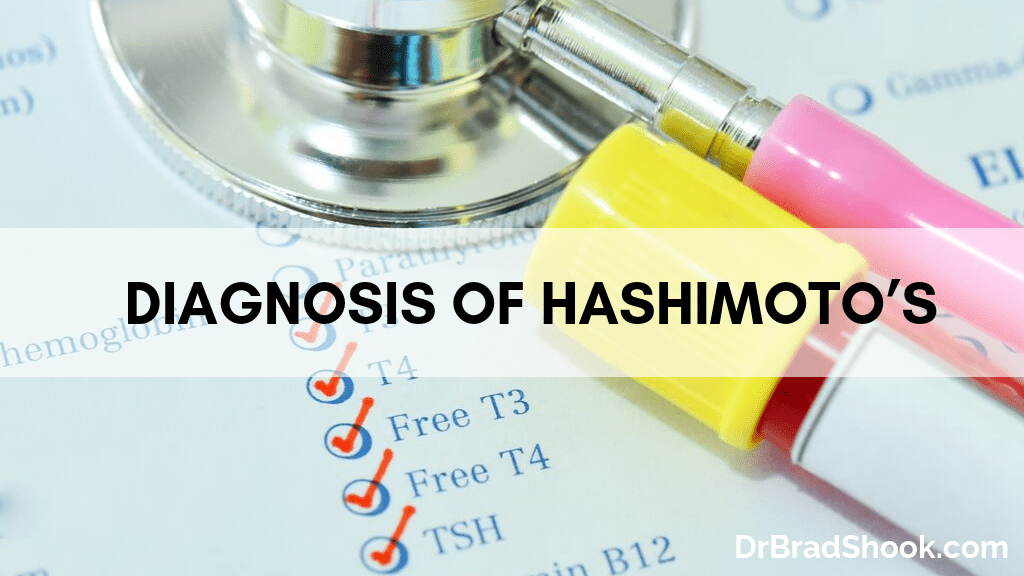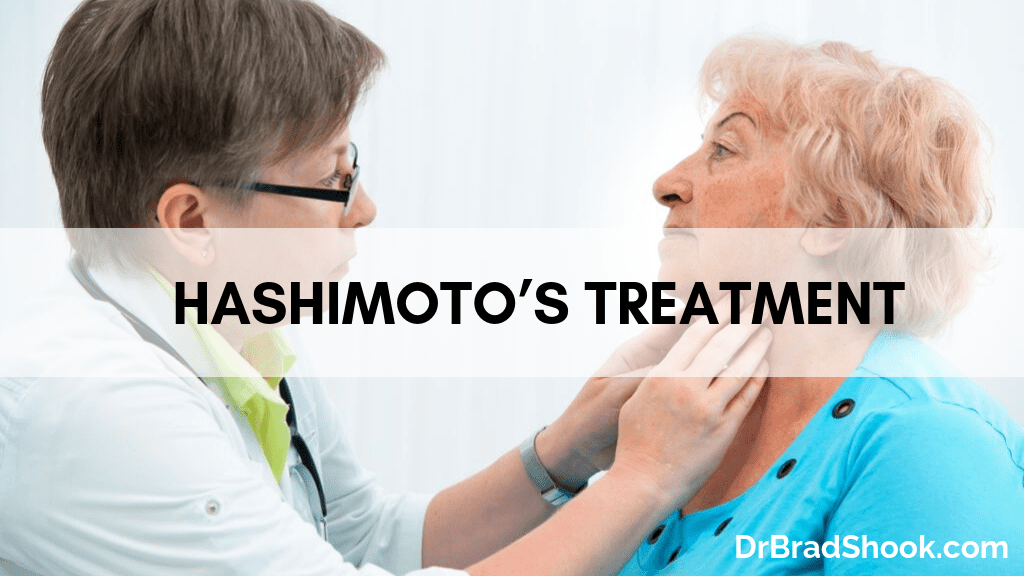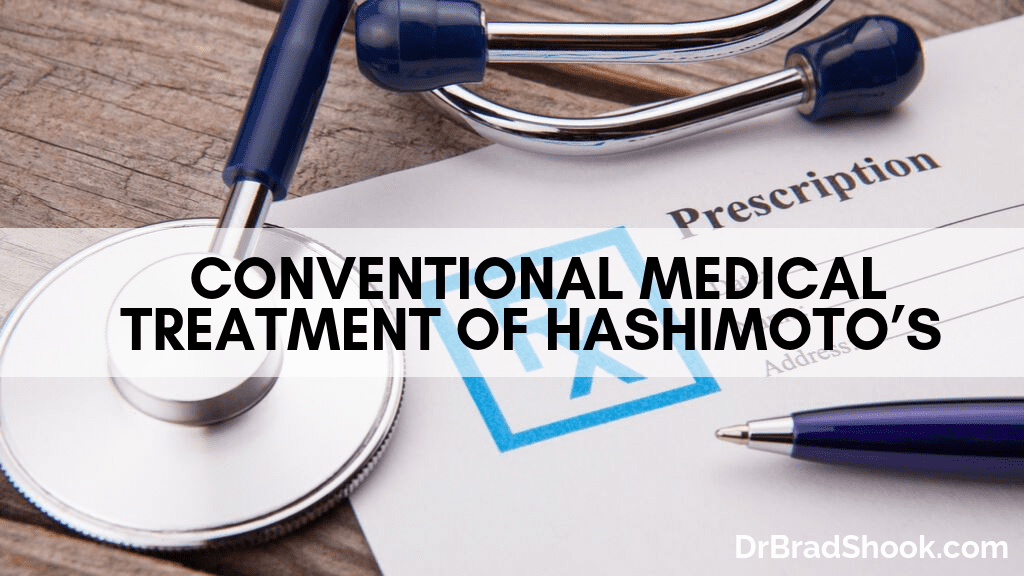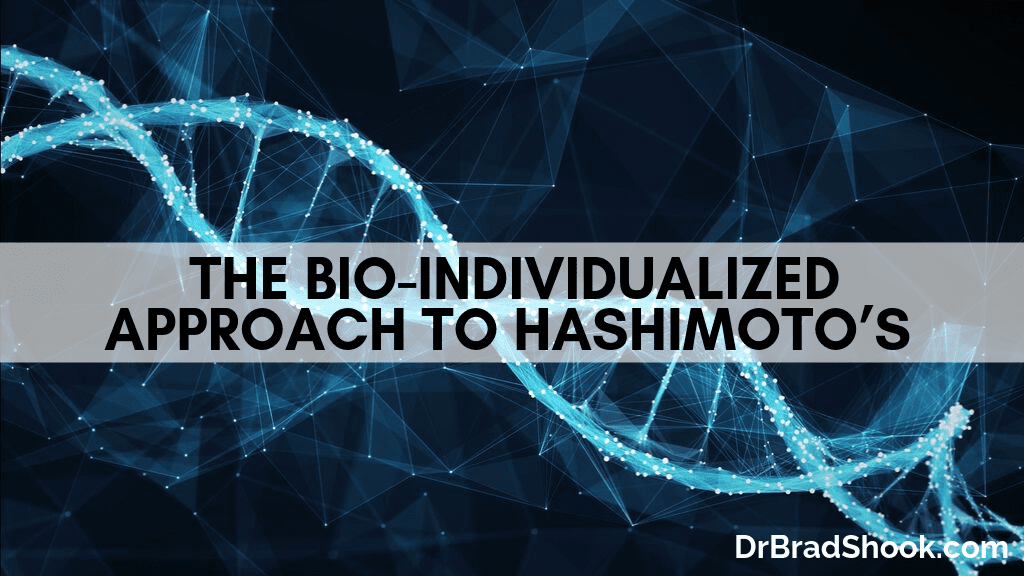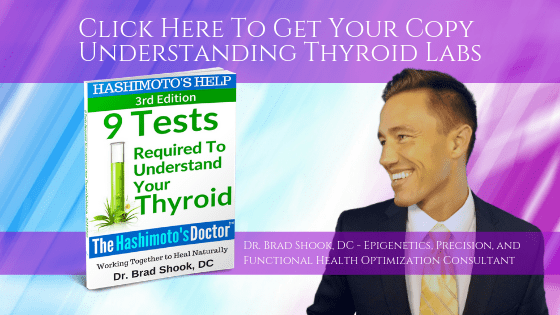Hashimoto's Disease Treatment Quick Navigation
Updated by: Brad Shook, DC January, 11th 2023
Hashimoto’s Disease Treatment
Hashimoto’s Disease Treatment Overview
Treatment of Hashimoto’s disease, also called Hashimoto thyroiditis, falls under the umbrella of traditional medicine.
Complementary and Alternative medicine is not considered a Hashimoto’s disease treatment but rather plays a supportive role.
Hashimoto’s disease treatment typically consists of observing symptoms and prescribing thyroid hormone replacement to support declining levels of thyroid hormone.
In some cases, thyroid hormone output is not compromised and your medical doctor may decide to monitor your symptoms and thyroid hormone levels before prescribing medication.
Thyroid hormone is essential to life, and if you are prescribed thyroid hormone replacement you will likely need to take it long-term. If you do not have the ability to make thyroid hormone naturally, thyroid hormone replacement is very important. Low thyroid hormone levels increase the risk of neurodegeneration, infertility, bone loss, fatigue, depression, goiter development, and accelerated aging.
Because there is no Hashimoto's disease treatment, but rather only treatments for the symptoms of Hashimoto's disease, you may be wondering if anything can be done to complement treatment or cure Hashimoto’s naturally?
The first thing to understand is that Hashimoto's is an autoimmune disease.
Hashimoto’s Autoimmune Disease
Hashimoto’s is an autoimmune disease. An autoimmune disease is a condition where the body’s immune system attacks itself rather than a foreign invader like a bacteria or virus.
In a normal immune system response, the immune system can differentiate between your thyroid and a foreign invader.
Hashimoto’s autoimmune disease is considered a chronic inflammatory autoimmune thyroid disease that progressively destroys the thyroid gland resulting in too little thyroid hormone, and slow, or lowered metabolism.
According to Harvard Medical School, there is no Hashimoto’s disease cure or autoimmune disease cure. Our current understanding of Hashimoto’s disease and Hashimoto’s treatment is that once the genetic expression of autoimmunity has been turned on, there is no known way to turn it off.
I discuss the leading theories on Hashimoto’s disease cause in another article you might like to read.
There are several complementary approaches to Hashimoto’s disease treatment that we will discuss in the “Hashimoto’s Natural Treatment” section.
Next, let’s discuss Hashimoto’s Thyroiditis diagnosis.
Hashimoto’s Thyroiditis Diagnosis
Hashimoto’s Blood Testing
When trying to make a Hashimoto’s Thyroiditis diagnosis, it’s important to understand that we are primarily talking about testing the blood for elevated thyroid antibodies.
Hashimoto’s blood testing is a topic of debate, and it’s my observation that in the clinical setting most primary care physicians will not order thyroid antibodies because it does not change the medical management of Hashimoto’s Disease.
Research published in 2018 demonstrates several reasons for the medical necessity of testing thyroid antibodies to detect Hashimoto's Thyroiditis as early in the disease process as possible.
The research connects the progression of Hashimoto’s Thyroiditis to hypothyroidism, thyroid lymphoma, and papillary thyroid carcinoma.
Routinely testing thyroid antibodies is commonly considered “not medically necessary” by insurance companies and is based on “best practice guidelines” established by some of the most authoritative organizations, like the America Association of Clinical Endocrinologists.
You might think that your doctor would want to know if your immune system is attacking your thyroid resulting in progressive destruction of thyroid tissue, but the reality is, they don’t have a treatment for Hashimoto’s disease, so why would they check for elevated antibodies if it doesn’t change the treatment?
Wouldn’t testing for a problem that has no medical treatment be a waste of money?
For many years the medical position on testing thyroid antibodies has been not to test, because there is no treatment available, and it doesn’t change the prognosis.
Research is now providing several excellent reasons to consider testing thyroid antibodies on a more frequent basis. If anything, there is an argument to made that thyroid antibody testing is not ordered frequently enough.
Hashimoto’s thyroiditis treatment is no different than hypothyroid treatment in allopathic medicine. If you are hypothyroid, the standard of care is to initiate thyroid hormone replacement therapy.
Your doctor will likely prescribe a thyroid hormone replacement medication, but they will not typically check thyroid antibodies as it does not change their treatment plan.
It’s not that your doctors don’t care, it’s just that they don’t have any tools in their toolbox to help the Hashimoto’s autoimmune process, but they can help you with the worst side-effect of Hashimoto’s, low thyroid hormone levels.
If you’re hypothyroid, research suggests you have a 90% chance of having an autoimmune thyroid condition called Hashimoto’s Thyroiditis as the cause of your hypothyroidism.
Some physicians will order TPO antibodies and TSH to help them determine if you have subclinical hypothyroidism (elevated TSH with normal thyroid hormone levels) and if they should treat it. The Mayo Clinic Proceedings suggests the evidence for the treatment of subclinical hypothyroidism is inconclusive with a TSH between 5.1 and 10mlU/L.
There are several lab tests with Hashimoto’s hypothyroidism that are beneficial in helping you understand if there is a physiological breakdown in thyroid chemistry not commonly considered if you have Hashimoto’s disease.
Thyroid Antibodies Testing
Thyroid antibody testing is a test that measures the number of thyroid antibodies in your blood. If high, these antibodies suggest that your immune system is attacking your thyroid gland, which is an abnormal response.
Your thyroid makes thyroid hormones that regulate cellular energy production, and it has a significant impact on metabolism, energy levels, body temperature, mood, and just about every function in the body.
Every single cell in your body requires thyroid hormone to function.
Antibodies are made by the immune system to tag and identify foreign invaders like bacteria, viruses, parasites, fungi, basically anything foreign. If antibodies attach to your tissues, this is called an autoimmune response, and it can lead to an autoimmune condition like Hashimoto’s.
Commonly Evaluated Types of Thyroid Antibodies
The immune system can produce a tremendous number and variety of antibodies. Thyroid specific antibodies usually do one of two things, cause an overproduction of thyroid hormone or they tag the thyroid tissue for destruction by other immune cells.
Thyroid Antibodies Associated with Hashimoto's Disease:
- TPO - Thyroid peroxidase antibodies are most commonly a sign of Hashimoto’s thyroiditis, also referred to as Hashimoto’s disease.
- Tg - Thyroglobulin antibodies - found in 70% of Hashimoto’s Thyroiditis cases and 30% of Graves’ Disease cases.
- Thyroid Antibodies Associated with Graves’ Disease
- Thyroid-stimulating hormone (TSH) receptor antibodies
- Tg - Thyroglobulin antibodies - found in 70% of Hashimoto’s Thyroiditis cases and 30% of Graves’ Disease cases.
Why do you need thyroid antibodies tested?
Elevated Inflammatory Levels
Determining if you have an inflammatory condition like Hashimoto’s can be helpful in better understanding your symptoms and help develop strategies to support the inflammatory process.
The leading cause of hypothyroidism is Hashimoto’s disease. If you have hypothyroid symptoms and your TSH is normal, the autoimmune process against your thyroid may be causing some of your symptoms even though your thyroid lab tests are normal.
Keep in mind all hormones in the body must go through four phases physiologically to be properly used by the body, or you can develop symptoms associated with the hormone.
The four phases every hormone must go through in the body:
- Production (T4, T3)
- Transportation (thyroid hormone binding globulins)
- Sensitivity (cellular receptors)
- Detoxification (biotransformation)
The immune response associated with Hashimoto’s thyroiditis can increase inflammatory levels in the body and is associated with hypothyroidism, thyroid lymphoma, papillary thyroid carcinoma and other autoimmune diseases.
Elevated inflammatory levels have been shown to dampen cellular receptor responsiveness to thyroid hormones. Disruption of thyroid hormone sensitivity is the third phase of hormone physiology that every hormone must go through, and when disrupted, can create symptoms.
Disruption of thyroid hormone sensitivity could cause thyroid like symptoms even though thyroid hormone levels (production) are normal. This is a prime example of how you could have normal hormone levels and still not feel well.
There are many ways thyroid hormone physiology can breakdown other than just a problem with the amount of hormone, or production.
How are thyroid antibodies tests performed?
To test your thyroid antibodies a simple blood test will need to be performed. Usually a healthcare professional will draw a small amount of your blood that will be collected in a vial and sent to the lab for analysis. Your results are typically returned within a few days.
Do you need to fast for thyroid antibody testing?
Unless instructed otherwise by your doctor, there is no need to go to the lab fasting or make other preparations for a thyroid antibodies test. If you are having other blood work done at the same time then your doctor may give you specific instructions that need to be followed. Just make sure to ask your provider if they do not give you specific instructions on how to prepare for the test.
How do I interpret thyroid antibody testing results?
There are a few possible outcomes when you get your thyroid antibodies test results that you want to be aware of.
- Positive antibodies to TPO and possibly Tg. This suggests you have Hashimoto’s disease.
- Positive antibodies to TSH receptor antibodies and possibly Tg antibodies. This suggests you may have Graves’ disease.
- Negative antibodies suggest your problems are not caused by Hashimoto’s or Graves’, but it’s important to know that some people test as seronegative.
Seronegative means that you do not show detectable antibodies to your thyroid but you still have an autoimmune disease.
This is more common in people with a suppressed immune system.
Do the number of thyroid antibodies correlate with the severity of my Hashimoto’s?
No research to date has indicated that higher antibodies correlate with more severe autoimmunity, though in one study, elevations in Tg antibody levels showed increased risk of differentiated thyroid carcinoma.
Hashimoto’s Autoimmune Disease Imaging
Can Hashimoto’s disease be diagnosed with Ultrasound or Fine Needle Aspiration (FNA)?
An ultrasound and FNA can also be helpful in determining if you have Hashimoto’s as they both provide information to help your doctor determine if the immune system is attacking the thyroid gland.
It’s important to understand that Hashimoto’s is a clinical diagnosis that is made based on your health history, exam, and blood test results.
There are some common changes to thyroid chemistry that often occur in people with Hashimoto’s disease and hypothyroidism that are very important to understand and consider when trying to best determine how to improve symptoms.
Six Patterns of Thyroid Chemistry Breakdown You’ve Never Had Checked
The six most common patterns of functional physiological breakdown of the thyroid that I observe clinically are:
- Primary Hypothyroidism (most commonly due to Hashimoto’s)
- Pituitary Hypothyroidism Pattern (common with stress and high cortisol)
- Thyroid Under Conversion Pattern (common with a nutrient deficiency)
- Thyroid Over Conversion Pattern (common with PCOS, elevated testosterone)
- Thyroid Hormone Estrogen Pattern - Elevated Thyroid Binding Globulins (common with birth control)
- Thyroid Resistance Pattern (common with being overmedicated)
Now let’s discuss Hashimoto’s Thyroid Disease Treatment.
Hashimoto's Treatment
Hashimoto’s Disease Cure
It’s very important to understand that there is no Hashimoto’s treatment, or Hashimoto's disease cure.
Why?
Hashimoto’s is an autoimmune disease, and there is no current treatment for autoimmunity other than using medications like anti-inflammatories, steroids, and immunosuppressants to mitigate the symptoms.
Treatment and management of hypothyroidism, one of the most significant consequences of Hashimoto’s disease is possible with thyroid hormone replacement.
Thyroid hormone replacement does not cure or treat Hashimoto's thyroiditis, but it does treat the number one symptom and side effect of Hashimoto’s, which is hypothyroidism or low thyroid.
Thyroid hormone replacement is an essential treatment for people with hypothyroidism, and there are several medications that your doctor may consider. We will discuss Hashimoto’s medication in the next section.
Hashimoto’s Thyroid Disease Treatment
Conventional Medicine Treatment of Hashimoto’s
Hashimoto’s disease causes progressive destruction of the thyroid gland resulting in a decreased capacity for thyroid hormone production. Thyroid hormone is vital to life, and without thyroid hormone, every cell in the body is compromised in its ability to optimally function.
Thyroid preparations have been used for hundreds, if not thousands of years in several cultures. In the 1809s, medical textbooks described methods of thyroid gland preparation, and in the 1940s desiccated thyroid glands from cattle and pigs were used for thyroid hormone replacements.
In 1955 Synthroid was developed and was a medical breakthrough. Synthroid provided a standardized dose of T4, which at the time, was not possible with desiccated thyroid hormone preparations. Today, thyroid hormone replacement is highly standardized, including forms of Natural Desiccated Thyroid, or NDT.
The good news is that thyroid hormone replacement therapy can be very successful in the treatment of the most common complication of Hashimoto's disease, low thyroid hormone levels.
It’s important to first understand the mechanism for declining thyroid function. If you have Hashimoto’s, then you are more likely to have at least one more autoimmune disease, and these other autoimmune conditions are often not yet identified.
There are several different types of thyroid hormones prescribed by physicians.
Hashimoto’s Medication
Thyroid Hormone Replacement Therapy
Synthetic Thyroid Hormones
Hashimoto’s disease destroys thyroid tissue resulting in a lowered capacity to produce thyroid hormone. This decreased capacity to produce thyroid hormone typically results in low thyroid hormone levels and high TSH, indicating hypothyroidism.
If you are hypothyroid it’s likely that your doctor will recommend thyroid hormone replacement therapy, which is usually in the form of the synthetic thyroid hormone levothyroxine. The most commonly prescribed thyroid hormone replacement is Synthroid, synthetic T4.
Synthetic T4 brands approved by the FDA
- Levo-T
- Levothyroxine - generic
- Levoxyl
- Novothyrox
- Synthroid
- Unithroid
- Tirosint - promoted as low excipient. Learn more on Tirosint’s website.
Synthetic T3
- Cytomel - brand name. Visit the manufacturer’s website here.
- Liothyronine - generic
Synthetic T3:T4 Combination
Natural Desiccated Thyroid Hormones (NDTs)
NDTs, or Natural Desiccated Thyroid Hormones have been used successfully to treat hypothyroidism. NDTs are dried thyroid glands from pigs or cows. The dried or desiccated thyroid glands provide a source of T3, T4, and other thyroid hormones found in humans.
NDTs have at least been used since the early 1800s, but ancient cultures may have used thyroid glands from other animals for thousands of years.
There are several brand name NDTs prescribed in the United States, even though they are not approved by the FDA for thyroid disorders.
Many celebrities have thyroid conditions and some report taking NDT as part of their treatment.
Bioidentical T3 and T4 Combination Thyroid Replacement Hormones
- Armour - brand name (Armour website)
- Westhroid - brand name, same formula as Nature-Throid (Westhroid website)
- Nature-Throid - brand name, same formula as Westhroid (Nature-Throid website)
- WP Thyroid - brand name (WP-Thyroid website)
- Desiccated Thyroid - generic
An important fact when considering NDT hormone replacement is that the T4 to T3 ratios (4:1 in NDT) are typically not the same as those found in humans (approximately 16:1).
A low T4 to T3 ratio (i.e 4:1) means that taking NDT tends to produce hyperthyroidism in some people, and this is why many physicians do not recommend it.
Taking Thyroid Hormones The Right Way
Taking thyroid hormones on a schedule is critical to maintaining optimal thyroid hormone levels.
Three keys for taking thyroid hormone replacement are recommended by most doctors:
- Take it every day at the same time, typically before breakfast unless you speak with your doctor and they clear you to take the hormone at another time of day, such as at night, before bed.
- Take it with water only, and on an empty stomach
- Do not eat or drink anything other than water 30 minutes to one hour after taking it
What time of day should you take thyroid hormone medication?
The most common recommendations by physicians’ are to take thyroid hormone in the morning on an empty stomach, and wait at least one hour before eating or drinking anything other than water.
Other recommendations are to take thyroid hormones four hours apart from food, medications, and supplements.
Recent research demonstrated lower TSH levels and higher thyroid hormone levels when thyroid hormones were taken at night before bed.
Make sure to ask your doctor if taking thyroid hormone before bed is right for you. People that take T3 may have problems with their sleep.
How to find a doctor that prescribes T3 and NDT thyroid hormone medications
It’s important to know that most primary care physicians will only prescribe T4 medications.
T4 is considered a safer medication to prescribe because it’s only 25% as physiologically active as T3, and therefore, less difficult to manage and understand the patient's response.
Some patients report doing better on T3, or T3:T4 combination medications, but finding a doctor that is comfortable prescribing these medications can be difficult.
One of the best tips I’ve learned to help you find a doctor that prescribes T3 medications is to call your local pharmacies and ask the pharmacist who in your community prescribes these medications.
Once you have that information you can research the doctor and look into scheduling an appointment.
Monitoring Thyroid Hormone Levels
Typically doctors monitor your thyroid hormone status by checking your TSH (Thyroid Stimulating Hormone).
TSH is produced by a brain-based gland, your pituitary gland. TSH stimulates thyroid hormone production and is a way to observe the signals from the brain to the thyroid, so it’s believed to be the best way to determine the thyroid hormone needs of the body.
The pituitary gland is part of the HPT axis (Hypothalamus-Pituitary-Thyroid Axis), the brain-brain-thyroid feedback loop the body uses to regulate thyroid hormone levels.
Low Dose Naltrexone (LDN)
Some people have seen improvement in their autoimmune symptoms through the use of Low Dose Naltrexone (LDN).
Naltrexone is a medication that is used in higher doses to help people with opioid or alcohol withdrawal.
The potential benefits of LDN are believed to be due to its immune regulatory impact.
Substances That Affect Thyroid Hormone Absorption
There are some substances that can affect thyroid hormone absorption, so make sure you take your hormone away from food.
Substances known to cause thyroid hormone absorption problems:
- Iron Supplements
- Some antacids
- Calcium Supplements
- Some ulcer and cholesterol medications
Hashimoto’s Natural Treatment
Is There A Hashimoto’s Thyroiditis Natural Treatment?
Before we discuss alternative and complementary medicine treatment of Hashimoto’s, it’s important to understand that there is no Hashimoto’s thyroiditis natural treatment.
The only treatment of Hashimoto’s falls under the umbrella of allopathic medicine.
No matter what you read on the internet, there is no Hashimoto’s “natural treatment,” but rather there are ways to support and focus on the improvement of systemic health and physiology by using diet, lifestyle, and temporary nutritional supplementation.
Let’s talk about some of the complementary and alternative approaches to Hashimoto’s disease.
Complementary medicine is not a treatment for any condition but is focused on playing a very important supportive role.
Alternative medicine is a concept where a system of healing would be used in place of medical care.
I do not recommend alternative medicine for Hashimoto’s because it’s my opinion that combining traditional medicine with complementary medicine gives us the best chance for optimal outcomes long-term.
Let’s look at some of the evidence and strategies behind a complementary medicine, and a systems biology approach to Hashimoto’s disease and autoimmunity.
Hashimoto’s Thyroiditis Diet
Research suggests “an online diet and lifestyle program facilitated by a multidisciplinary team can significantly improve health-related quality of life and symptom burden in middle-aged female subjects with Hashimoto's thyroiditis.”
After working with thousands of people in the clinical setting, it is obvious that diet is one of the most critical and impactful things we can do to decrease systemic inflammation, support immune regulatory function, balance blood sugar, and improve digestive function.
I developed an online diet and lifestyle program with a built-in support group to help my clients and the general public access a clinically validated, simple to implement system, that has worked for hundreds if not thousands of people with Hashimoto’s and autoimmunity.
In an ideal scenario, everyone with Hashimoto's would be tested for immunological triggers.
Food sensitivity testing, pathogen testing, and chemical immune reactivity testing are ideal when developing a bioindividualized plan to determine the best starting point.
Lifestyle Changes for Hashimoto’s
Sleep, stress reduction techniques, and exercise have an impact on inflammatory pathways in the body.
One study on sleep showed an association between asthma, RA, SLE, and IBD. Decreased sleep was associated with higher CRP, IL, and PGs.
It’s interesting that when I work with clients they will tell me they have trained their body to work with less sleep, but the reality is they have taught their body to accept diminished performance and systemic health.
Red flags you’re not getting enough sleep:
- You need an alarm to get up
- Drowsiness when waking or throughout the day
- Fall asleep in less than 5 minutes
- Most adults need 7 to 9 hours of sleep, and some of my autoimmune clients required up to 10 hours of sleep every night.
In the clinical setting one of the most powerful changes we can make with a client is the optimization of sleep.
Vitamins for Hashimoto’s
Research demonstrates multiple nutritional factors that appear to increase the risk of Hashimoto’s Thyroiditis.
Key nutrient insufficiencies research suggests play a significant role in Hashimoto’s:
- Vitamin D - supports immune regulatory function
- Selenium - supports the production of glutathione peroxidases that remove excessive hydrogen peroxide
- Iron - supports thyroid peroxidase (TPO) production, which is a haem enzyme that becomes active only after binding haem. TPO is required for thyroid hormone production.
Bioindividualized Systems Biology and Functional Medicine Approach to Hashimoto’s
Clinically, I look at Hashimoto's from two perspectives, is there a loss of normal Immune regulatory function, and is there active immune reactivity to antigens (something foreign to the immune system).
To help determine if someone has immune system dysregulation or an active antigen, the first step I take is to try and detect these problems through a process of investigation using laboratory testing.
Once I have gathered and reviewed the test results, a plan to remove active antigens (food sensitivities, pathogens, chemicals) and replenish vitamin and mineral levels to support Regulatory T-Cell function is started.
After removing immunologically reactive foods, pathogens, and chemicals, and supporting better immune regulatory function I transition to a plan more focused on repairing damage to the body’s barrier systems like the intestinal lining.
The overall approach I take is called a “systems-based approach,” or “systems biology approach.”
The systems-based approach to optimizing human health seeks to move people toward health, rather than away from disease, and tries to incorporate as much information as possible about the possible triggers and drivers of the autoimmune process.
To learn more about the three-phase, systems-based process of Detect, Remove, and Repair that I use clinically to support Hashimoto's, you can visit my website here.
Do you need help understanding thyroid and Hashimoto’s blood tests?
If you would like to learn about the nine thyroid tests required to better understand your thyroid guidebook I created, click here.
Hashimoto's Disease Treatment References
Hashimoto's Disease Treatment Video Series
Hashimoto's Treatment - Three Core Videos
- Why do you have thyroid symptoms?
- Why your doctor may not be able to help your thyroid problem.
- Dr. Shook's approach to Hashimoto's Disease, Hypothyroidism (high TSH), Graves' and autoimmunity.
The number one condition contributing to low thyroid function or hypothyroidism is an autoimmune condition called Hashimoto's Thyroid, or thyroiditis.
Women are most commonly diagnosed as hypothyroid, this is believed to be due to hormonal changes, and possibly dietary changes that could promote "leaky gut" or intestinal permeability.
One of the most unsettling discoveries I made along my journey of trying to help myself with ADD, IBS, psoriasis, and autoimmunity against my thyroid was that up to 90% of people that are hypothyroid are actually hypothyroid due to an autoimmune process call Hashimoto's against their thyroid gland, and the process is almost totally ignored in the US medical system today.
What this means is that if you are hypothyroid, you may not have a true primary thyroid condition, but rather an autoimmune condition called Hashimoto's, or Hashimoto's Thyroiditis that affects 9 of 10 people that have a low thyroid condition! This is a huge problem because if you ignore the autoimmune process against the thyroid it could expand to other tissues and predispose you to other problems and declining health.
Many people with hypothyroidism or symptoms of a low thyroid are never diagnosed as having an autoimmune condition, and if they do, the typical medical protocol is to ignore the autoimmune condition.
With what we know about autoimmune conditions today, and from the contemporary indexed medical literature, autoimmune conditions are rarely singular.
What I mean is that if you run a laboratory test on tissue antibodies (they tell you if your immune system is attacking your own tissues, which it should not) that we find most people with one confirmed autoimmune condition actually have multiple tissues being attacked, this is called autoimmune expansion.
These antibodies against other tissues are called predictive antibodies because they "predict" future organ failure. That's right, over time your immune system will destroy your tissues leading to major problems.
The goal of what I do is to help identify the immune system triggers or things that are flaring up the immune system so that your immune system can be supported and calmed down, with the goal of putting your autoimmune condition into remission.
There is no cure for autoimmunity, but my goal is to help people dampen the process, get into remission and have vibrant health.
I know this well because I have autoimmunity against my thyroid, psoriasis and have dealt with many of the driving factors my clients and patients have faced that are believed to drive the autoimmune process.
I have used precision medicine, functional medicine and genomics to put my autoimmunity into remission.
You can learn more about the latest science in the natural support of autoimmune thyroid conditions like Hashimoto's Thyroiditis from in the video series below.
Autoimmune Hashimoto's Thyroid Education Series
Natural Support Options For Hashimoto's Thyroiditis and Low Thyroid or Hypothyroidism
The Natural Approach To Autoimmune Conditions
Why your labs for autoimmune thyroid with Hashimoto’s may be false negative.
The Problem with the Typical Medical Approach to Thyroid Disorders
Autoimmune Food Triggers, Including Hashimoto's Thyroiditis
Physiological Triggers to Autoimmunity, Including Hashimoto’s Thyroiditis
Molecular Mimicry, Immune Response to a Food and Hashimoto’s
How Tuna Could Be Making Your Autoimmune Thyroid (Hashimoto’s) or Autoimmune Condition Worse
Do you need to be on thyroid replacement therapy if you have Hashimoto’s?
Which Thyroid Hormone is best?
Did you know that low thyroid hormone promotes brain degeneration?
An important step we take when working with patients that have Hashimoto’s.
Why your TPO antibodies may go up with Hashimoto’s thyroid as you get healthier.
Latex and autoimmune Hashimoto’s Thyroid
How do you detox chemicals that trigger autoimmune conditions like hashimoto’s thyroiditis?
Common traits of people that have good outcomes with functional medicine for Hashimoto's.
About the Author:
Dr. Shook has psoriasis and Hashimoto's disease and has trained extensively in functional medicine, epigenetics, and human performance optimization. DrBradShook.com is a resource to help people with Hashimoto's disease, thyroid dysfunction, and other autoimmune conditions learn more about how they can complement their current medical care and support their thyroid and autoimmunity naturally.



